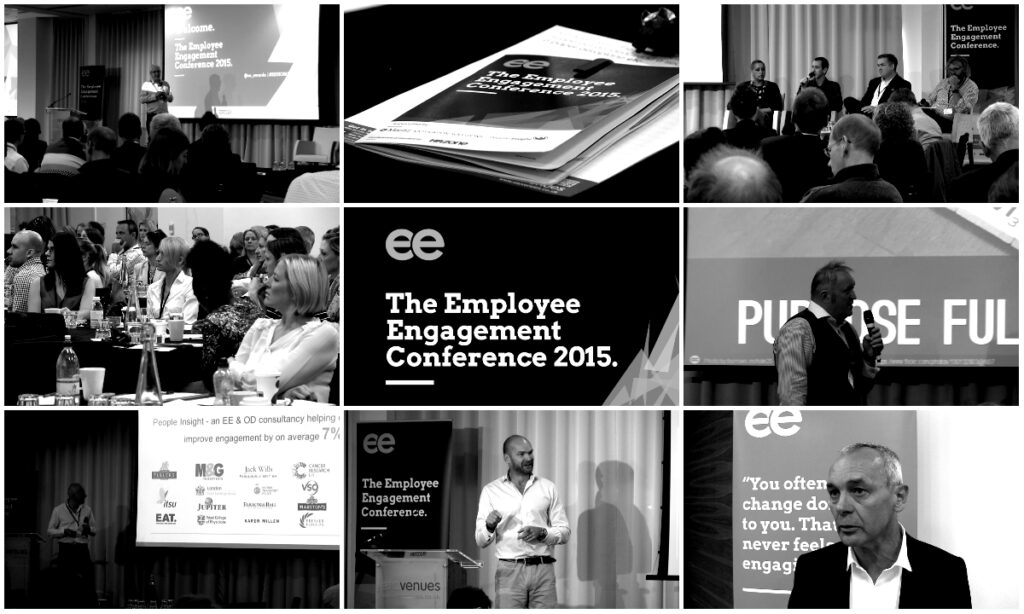On September 10th 2015 180 HR professionals attended an event dedicated to making their engagement efforts more organisationally-focused – so they added real business impact. Follow all the commentary on the hashtag #EEUK2015.
#1 Giving people space is not always the best choice
Keynote Alison Lowe, CEO of Leeds mental health charity Touchstone, told a personal story of when her charity had to make people redundant. Having experienced redundancy as a single mother before, she gave people space to grieve and explore their feelings. She thought she was doing the right thing…
Yet she told the audience she should have communicated more and made room for dialogue, as people did not view the ‘giving of space’ well and thought they were being ignored by the organisation.
#2 CEOs doing engagement don’t use the word engagement
We hosted a CEO panel in which we discussed how people-focused CEOs increase engagement throughout their organisations. Interestingly all three said they don’t use the word ‘engagement’ – instead they focus on culture, alignment, communication and reinforcement.
This is useful for HRDs looking to get senior leader buy-in – maybe engagement should be the result, not the name of the initiative.
#3 Understanding your metrics helps provide a focus for engagement
We heard from Dr Steven Chase, Director of People for Thames Valley Police. Rather than profit or revenue which you’d see as a key focus in a commercial environment, Steven said the core focus at Thames Valley is on public service motivation (PSM). Significant effort goes into understanding the research around PSM, and how engagement initiatives link to increases in PSM.
#4 Values should be used to help employees guide behaviour
Chris Winkelspecht of Maritz Motivation Solutions outlined five principles of successful engagement. One focused around company values, which many organisations now have. However, not all use values as a sounding board for behaviours and this is key to embedding values within the organisation.
Greater autonomy for all employees comes when they are free and encouraged to use values to judge whether a particular course of action is the right one to take.
#5 Job shaping and design can improve productivity and engagement
Michael Moran, CEO of leadership consultancy 10Eighty, talked about job shaping and tailoring and spoke of how organisations should commit to tailoring jobs to employee strengths and also what they enjoy.
He added that if people enjoy doing something they will develop proficiency at doing it and will deliver high levels of productivity to the organisation. They will also be more receptive to feedback and continuous improvement.
#6 Social business is the future, rather than building engagement
Organisational guru Perry Timms took to the stage to convince attendees of the value of working socially – proper social working that is, not just socialising at work. The difference is in attitudes (collaborative, growth mindsets, feedback loops, challenging upwards) and tools (collaboration platforms rather than transactional systems).
Social, buzzing companies also tend to attract great PR and, subsequently, the very best employees. Another great take away from Perry was that organisations should get rid of hierarchies and start building interest communities. He’s a big fan of the Chief Collaboration Officer role.
#7 Collaboration can significantly enhance positive change following surveys
We heard from Elizabeth Sideris, Executive Director for HR at Cancer Research UK, who outlined some interesting advice for post-engagement survey action. Following surveys the HR team works with the leadership team to produce a plan and implementation timeframe for cultural action.
As a result of this change, the charity has seen a 10% improvement in responses to the survey question “Will change result from this survey?”
#8 Change can cause disengagement – people must focus on the opportunities
Adventurer, TV personality and shipwreck diver Monty Halls delivered our closing keynote and told stories about his times leading teams in extreme environments. He said that continuous change can make people fearful and disengaged but that there are amazing opportunities inherent in change.
If people don’t understand these opportunities they will resist change so it’s important for organisations to help employees see and embrace opportunities as they arise, so everyone emerges more strongly.











